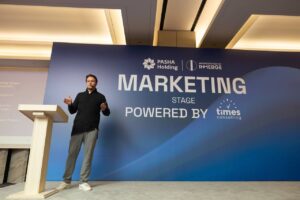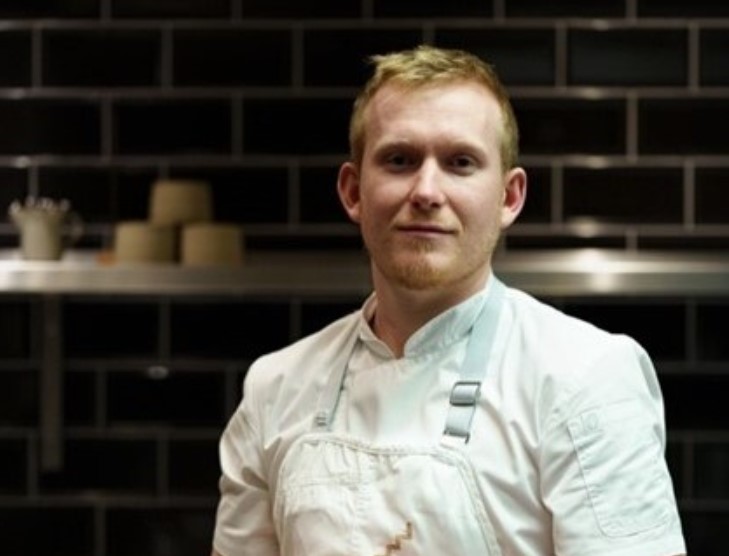Much fuss has been made about the fact Ottessa Moshfegh wrote her brilliant breakthrough novel Eileen in 90 days using a rudimentary how-to guide that she picked up in a bookstore. The book would end up winning the Pen/Hemingway Award in 2016 and was shortlisted for both the Man Booker Prize and the National Books Critics Circle Award.
The revelation of Eileen’s origins came as an affront to some readers. “People thought I had somehow cheated,” Moshfegh, 41, says now of the reaction. “As if I hadn’t been working my whole life to write Eileen.” Those same people will likewise be irked to learn that Moshfegh’s best-selling 90-day novel has now been adapted for the screen – and it’s a sumptuous film starring Anne Hathaway and Thomasin McKenzie. “I mean, if it’s so easy then let others try it – go pick up the manual!” laughs Luke Goebel, Moshfegh’s husband, a fellow writer with whom she co-wrote the film’s screenplay.
If there was ever any doubt about Moshfegh’s brilliance, her other bestselling, critically acclaimed novels are proof enough that Eileen was not a one-off. And Hollywood has come sniffing for more: Eileen is one of four novels currently getting the movie treatment; impressive given she has only written seven. British filmmaker Andrew Haigh is directing the adaptation of McGlue, her 2014 debut; Oscar-winner Yorgos Lanthimos and Margot Robbie are on board for My Year of Rest and Relaxation; David Lowery is adapting Death in Her Hands. “That’s it for now,” says Moshfegh. She and Goebel, though, are working on something separately with Eileen’s director William Oldroyd – albeit not an adaptation.
Seven novels and a decade into her career, Moshfegh has emerged not only as a foremost contemporary American author and vital voice – but also just a really cool writer. There was a moment in time in which reading (or at least being seen to read) My Year of Rest and Relaxation had the same social capital as carrying a New Yorker tote. The interest from Hollywood is astounding – but not unexpected. Moshfegh is not only a talented writer, she’s a buzzy one.
If her writing is cinematic, then Eileen is the pinnacle of that – not least because of its heavy noir influences. To read the book is to imagine it on a big screen. Set in mid-1960s Boston, Eileen tells the story of a down-home girl (played by McKenzie) aching to escape her small town and her gin-sodden father. She works at the local men’s prison as a secretary, spending her days sucking on sweets and sexually fantasising about the inmates. Then, a new psychologist – a beautiful blonde in a pillbox hat (Hathaway) – arrives as though transplanted from another, more interesting world.
The adaptation process was “intense”, Moshfegh and Goebel agree. “We write every word together,” Goebel explains. “Everything goes up as a possible line of dialogue, a possible action, a possible scene, a possible structure and then… we negotiate. And so, it was passionate; everything was a heated debate.” He laughs, suddenly. “Obviously, it’s a preposterous situation to be a man telling a woman how her book should be adapted but you have to serve the work best you can! And it’s not a book anymore; it’s a film!” Any time they didn’t agree on something, Moshfegh would shout across the room: “WELL, I WROTE THE BOOK!” to which Goebel would shout back: “THAT DOESN’T MATTER!” They grin at one another, recalling the memory. No harm, no foul.
In person, Goebel and Moshfegh are very obviously in love – an antithesis to the somewhat hardened veneer the latter presents. She herself had previously sworn off romance. They met in 2016, after Goebel wrote to her asking for an interview. They ate seafood, took a Valium and discussed literature. A week later, he went home for Christmas and asked for his grandmother’s wedding ring. That first meeting is immortalised on the website Fanzine. “It’s a little cringe,” says Moshfegh – though she’s still beaming.
I wanted to write a book that could be ingested by the average person. Not someone who was going to the weird indie bookstore way away, but the bookstore down the street
Ottessa Moshfegh
There is a lot in Eileen that would not have been possible – or possible to the same extent – had the writers not been married. The fact they are both sober certainly played a part in the film’s depiction of alcoholism; Goebel has not had a drink since he was 21. “And now I’m 30,” he deadpans. “Nah, I’m 42.” Moshfegh exclaims, “Isn’t that amazing? Over half his life. Every married couple has an intimate language – and our sobriety and alcoholism is definitely part of ours. We’ve both experienced losses because of addiction in our families.”
“Eileen is so informed by the people that we could reach and couldn’t save,” says Goebel. “There’s such a heaviness to the consequence of it,” says Goebel. “There are serious consequences to people being left uncared for or caring for people you can’t save.” The alcoholism Eileen depicts is a very specific sort: the “brush under the carpet and look away” sort that proliferated in that generation. “You know, 1964 in rural New England was more like the 1950s,” says Moshfegh. “A woman with an addictive tendency wasn’t commonplace but active male alcoholism was just expected. Looking back now, actually, I think it was a much more innocent time when you think about what addicts have to contend with – what’s available. It’s all so much more dangerous.”
Access unlimited streaming of movies and TV shows with Amazon Prime Video
Sign up now for a 30-day free trial
Sign up

Access unlimited streaming of movies and TV shows with Amazon Prime Video
Sign up now for a 30-day free trial
Sign up
Another, more interesting world: Thomasin McKenzie and Anne Hathaway in ‘Eileen’
(Universal Pictures)
There is definitely less drinking culture, Goebel suggests. “I’m not looking at numbers but just from what I can see. I was born in Ohio and grew up in Oregon and everybody was drinking,” he says. “It was rain and wine and beer and booze and cigarettes. The young people in the United States don’t seem like they’re drinking. I don’t know what they’re doing – beauty tutorials or something on their phone.” Moshfegh continues, “Yeah everyone is addicted to their iPhones and the people who used to have that punk or grunge or devil-may-care drinking attitude in our generation, now those people are dying of fentanyl. I’ve had so many loved ones and friends die of the opioid epidemic.” For a moment, they’re both quiet.
Lately, it has become fashionable to speak about unlikeable female protagonists in literature. Moshfegh is at least partly to thank (or blame?) for the trend. Her characters certainly fit the bill; they are murderers and perverts; they are violent; they are cruel; they fantasise about being raped and delight in releasing “torrential, oceanic” excrement. They are, by readers’ estimations, unlikeable. Moshfegh hates the term.
“It’s inherently misogynistic. You never hear about unlikeable male characters; those are just characters. Men in stories have been in first position so much that they have been exercised to have this complexity and range – they’re supposed to be what’s interesting,” Moshfegh says. She points to Susanna Kaysen’s Girl, Interrupted – [Susanna Kaysen’s 1993 memoir about her experience in a psychiatric hospital] – as a memoir that changed things. “Here’s an extremely intelligent woman who’s coming up against her emotional issues that are inspired by the oppressive society she’s in. It’s like, well, yeah, we’re all crazy because the world has been set up to keep us down – how could you be well? And so, it seems like when you call Eileen an unlikeable female character, it’s putting the blame on her for reacting to a life that isn’t built for her to thrive in. It’s just so judgemental.”
Social capital: Moshfegh’s bestselling novel and status symbol ‘My Year of Rest and Relaxation’
(Vintage)
Goebel interjects before I can: “But do you think they are celebrating it in a way? Do you think people are titillated by her being unlikeable or nasty?” Moshfegh thinks for a second and shrugs. “I don’t know, I think people love to hate women and so it’s hard to know whether they are titillated because it’s exciting and rebelling to see a woman like that… or is it because they love to call women terrible and disgusting? You know, the Hilary Clinton of it all; nasty woman.”
Every book Moshfegh writes reads like an author purposefully sloughing off what came before. Frustrated with the fixation on Eileen’s ugliness and physicality (this is the character who describes emptying her bowels with “torrential, oceanic” force), Moshfegh gave the protagonist of My Year of Rest and Relaxation supermodel looks. Still, the conversations surrounding attractiveness swirled – and so Death In Her Hands told the story of a seventy-something widow.
Eileen was written as the follow-up to McGlue, a debut (narrated by a drunken 19th-century sailor) she maintains is the “apotheosis of my foundation as a fiction writer” – meaning, experimental, voice-driven, and “really not very plot heavy”. The novella was critically acclaimed but not widely read. She approached Eileen with a different goal in mind. “I wanted to write a book that could be ingested by the average person. Not someone who was going to the weird indie bookstore way away, but the bookstore down the street,” she says. “It allowed me to do something I hadn’t given myself permission to do, which was to tell a straight-up story in a suspenseful and interesting way, while also being transgressive in all the experimental ways that I hoped McGlue would have an impact.” A few years ago, Moshfegh put it in less delicate terms: “I wanted to write a novel to start a career where I could live off publishing books. That was my prime motivation for writing Eileen. I thought, fine: I’ll play this game.”
Moshfegh’s bravado is talked about a lot in literary circles. In the same interview that she revealed Eileen was the result of The 90-Day Novel, Moshfegh said, among other things, “I’m smart and talented and motivated and disciplined and… talented. Did I say that already?” Speaking to her now, it’s hard not to think that a knowing smirk and arched eyebrow was missed out when conveying those quotes.
“Sure, I regret a lot of things from that interview,” she says, notably unbothered, when I bring it up. Goebel drops his jaw and looks aghast: “Really? You really take back being a daredevil in that way? But that bravado was a stake in the ground!” Evidently, he absolutely loved it. “Yeah,” says Moshfegh, reevaluating her answer. “And it was a bravado [revealing the origins of Eileen] that demystified the novel-writing process, which is important because it’s hard work. It’s literally labour.”
Off-camera: Anne Hathaway is directed by William Oldroyd on the set of ‘Eileen’
(Jeong Park)
Goebel and Moshfegh have an easy rapport, needling one another – sometimes seriously, but mostly in jest. “What about that gold statue you carry with you everywhere that says voice of a generation?” Goebel quips at one point when we’re speaking about the not-insignificant buzz surrounding Moshfegh.
It’s funny, I suggest, that the characters in both Moshfegh and Goebel’s fiction tend to be loners. Will that change now that they’ve found one another? “It’s true,” muses Moshfegh. “I think it plays out in our work.” She points to Lapvona [her most recent book; a grim fairytale set in a mediaeval village], which is written in the third person. “I don’t think I would’ve written a book in the third person if I hadn’t A) started living with a partner, or B) collaborating on a film. Before I was in a partnership, the only other partnership I knew intimately was my parents so now I have another data point reference as a writer writing about relationships, which is helpful.”
It’s not a coincidence that Goebel’s new book is also third person. “The way our characters torture each other, love each other, interact with one another,” he says, “these are things I would not have known how to do single.” Who knew data points could be so romantic?
‘Eileen’ is in cinemas from 1 December









